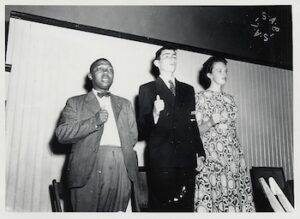
The Defiance Campaign against Unjust Laws
*The Defiance Campaign against Unjust Laws began on this date in 1952. The Campaign was the first "large-scale, multi-racial political mobilization against apartheid laws under a common leadership."
This Campaign was presented by the African National Congress (ANC) at a conference held in Bloemfontein, South Africa, in December 1951. The South African police were alerted about the action and were armed. In major South African cities, people and organizations performed acts of defiance and civil disobedience. The protests were largely non-violent, with many participants wearing tri-color armbands that signified their affiliation with the ANC. Black volunteers burned their passbooks.
Other Black volunteers would go into places that were "whites-only," which was then against the law. They were arrested and would not defend themselves in court, "leading to large-scale imprisonment." Others were offered fines as an alternative to imprisonment. The mass imprisonment was hoped to overwhelm the government. On November 9, 1952, police fired on a group of Black protesters in Kimberley, killing 14 and injuring 39. Other orders to shoot demonstrators "on sight" were issued by the South African Minister of Justice, Charles Swart. Arrests of peaceful protestors "disgusted a section of white public opinion." In July 1952, there were also raids on the offices of the ANC and SAIC.
As a result of the protests, the NP began "imposing stiff penalties for protesting discriminatory laws" and subsequently created the Public Safety Act. The Defiance Campaign protests "demonstrated large-scale and growing opposition to apartheid." The United Nations took note and called the apartheid policy a "threat to peace." The Defiance Campaigns, including bus boycotts in South Africa, served as an inspiration to American Civil Rights Activists in the United States.
In mid-April 1953, Chief Albert Luthuli, the President-General of the ANC, suspended the Defiance Campaign to reorganize in light of the new political climate in South Africa. Luthuli was tried for treason, was assaulted, and deposed as the chieftain of his Zulu clan. Nelson Mandela succeeded Luthuli as the leader of the ANC. Apartheid was finally ended in the early 1990s, marked by the 1994 South African general election, the first South African election held using universal adult suffrage. The Defiance Campaign launch date is now a yearly National Day of Protest and Mourning.